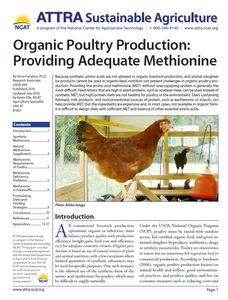{Tool} Organic Poultry Production: Providing Adequate Methionine. Creator(s): Fanatico, Anne. Issuing Organisation(s): NCAT - National Center for Appropriate Technology. OK-Net EcoFeed-selected tool. (2010)
![[thumbnail of 36943_Tool_54_OK-Net-Ecofeed_toolcover.jpg]](/36943/1.hassmallThumbnailVersion/36943_Tool_54_OK-Net-Ecofeed_toolcover.jpg)  Preview |
Image (JPEG)
- Cover Image
- English
172kB |
Document available online at: https://attra.ncat.org/product/organic-poultry-production-providing-adequate-methionine/
Summary in the original language of the document
Methionine is the most limiting amino acid in a typical poultry diet. In this article, they focus on protein/methionine requirements of poultry and balance in the diet. Some studies found that slow-growing broilers require lysine at the same concentration as fast-growing broilers. Laying hens have lower methionine requirements than broilers. Methionine requirements, amino acid balance and energy balance related to feed intake are also discussed with a table indicating the presence of digestible methionine in different feedstuffs.
Another topic is the difference in profit between small-scale vs large scale production looking at plant-based protein, animal-based protein and additional sources and how to add these to poultry diets. The tool concludes that synthetic methionine is necessary to satisfy amino acid requirements for organic poultry but that alternative sources of protein and animal proteins can help to reach amino acid balance.
The target group of the tool is organic feed advisors and it can be used for ration formulations.
| EPrint Type: | Practice tool |
|---|---|
| Teaser: | Methionine can be provided by intact protein or as a pure amino acid. |
| What problem does the tool address?: | Fulfilling amino acid methionine (MET) requirements without overfeeding protein is difficult, because in organic farming, synthetic amino acid and animal by-products are not allowed. |
| What solution does the tool offer?: | The tool encourages multiple-phase feeding, using high levels of protein during the starter phase of growth and then decreasing protein levels during the finishing phase. This is the way to pair the diet with nutrient requirements. |
| Country: | United States of America |
| Type of Practice Tool: | Leaflets & guidelines |
| Keywords: | animal husbandry, broiler chickens, feeds, ration planning, nutritional requirements, nutritive value, poultry |
| Agrovoc keywords: | Language Value URI English animal husbandry http://aims.fao.org/aos/agrovoc/c_8532 English broiler chickens http://aims.fao.org/aos/agrovoc/c_9435 English feeds http://aims.fao.org/aos/agrovoc/c_2843 English rations http://aims.fao.org/aos/agrovoc/c_6461 English nutritional requirements http://aims.fao.org/aos/agrovoc/c_5277 English nutritive value http://aims.fao.org/aos/agrovoc/c_5278 |
| Subjects: | Animal husbandry > Feeding and growth Animal husbandry > Production systems > Poultry |
| Research affiliation: | European Union > Horizon 2020 > OK-Net EcoFeed European Union > Horizon 2020 > OK-Net EcoFeed > Selected tools USA > Other organizations USA European Union > Organic Farm Knowledge |
| Related Links: | https://attra.ncat.org/viewhtml/?id=336, https://attra.ncat.org, https://organic-farmknowledge.org/tool/36943, https://www.facebook.com/organicfarmknowledge/photos/a.341364110046066/565614237621051, https://twitter.com/farm_knowledge/status/1207656985128325120 |
| Project ID: | ofk |
| Deposited By: | Forschungsinstitut für biologischen Landbau, FiBL |
| ID Code: | 36943 |
| Deposited On: | 13 Dec 2019 11:05 |
| Last Modified: | 02 May 2024 10:32 |
| Document Language: | English |
| Status: | Published |
Repository Staff Only: item control page

 Download Statistics
Download Statistics Download Statistics
Download Statistics
